- Home
- David Downing
One Man's Flag Page 7
One Man's Flag Read online
Page 7
She and Michael had agreed to meet that evening, and it was only the prospect of spending time alone that persuaded her not to cancel. At dinner he asked her how the story was going and quickly changed the subject when she insisted on talking of something else. “Tell me more about America,” he said, and she did her best to oblige. He would be better off there, she thought at one point—what was there for him here but either years of frustration or the sort of exploit that had killed her brother?
Upstairs in her room, it was easier to pretend than refuse, but she knew it was the last time. Once he’d gone to sleep, she lay there thinking about the other men she’d “known,” as their old family priest would have put it. There hadn’t been that many, despite what others had sometimes seemed to think. After the first experience with poor Danny Cryer, she’d always enjoyed the sex, which she knew from talks with other women was far from usually the case. But until Jack McColl came along, the physical pleasure was all she’d felt, because nothing else had been shared. He’d been different—or at least she thought so at the time. He had given every sign of enjoying who she was.
Ironic, she thought, that the one man who seemed to truly like her was the one who had betrayed her.
Let it go, she told herself, or you’ll never get to sleep. Work was what mattered now; a love life would have to wait.
She was not done with Dublin—Maeve and Cumann na mBan were definitely unfinished business—but she needed a rest from Ireland and its problems. Tomorrow she would take the train to Belfast and visit the other Kieran’s family. And then she would have a long think about how she intended fulfilling Colm’s request. There was no hurry with this story, and there were others more urgent to tell. From Belfast she would take a boat to Glasgow, where working-class women had initiated and then organized the rent strikes now sweeping the city.
Michael was gone when Caitlin woke up next morning, so she left a letter at the desk, saying she hoped to be in touch sometime in the next few weeks. It was raining outside on Grafton Street and still raining four hours later when she stepped off the train in Belfast. The Coakleys’ neighborhood seemed even more down-at-heel than the Breslins’ had done, and it did nothing to brighten her mood. Neither did the ensuing encounter with Kieran Coakley’s parents. She was invited into their neat little parlor, but that was the extent of the welcome. Maureen and William Coakley were angry about their only child’s death, angry with him and just about everyone else, including Caitlin herself.
“So your brother was one of them?” Maureen Coakley asked aggressively.
At first Caitlin thought they were doubting her bona fides. “Yes, his name was Colm. He was executed in April.”
“Did he ever realize what a mistake he had made?”
“No, he—” She stopped herself. “Is that what your son thought?” she asked.
“He was seventeen!” Maureen almost shouted.
“Like that idiot Kieran Breslin,” her husband added. “How old was your brother?” he asked.
“Twenty,” she said.
“Old enough to know better,” William Coakley said. “But it’s the leaders I blame. They find these young men, fill their heads with romantic nonsense, and they send them off to die. More martyrs to sing their stupid songs about. And for what this time? Home Rule’s been promised once the war ends—after all the centuries of oppression they never stop talking about, couldn’t they wait another couple of years?”
“And what are you going to write?” his wife asked Caitlin. “Something to glorify them? Something to fool their families into thinking that their loss was actually worthwhile? How can you live with yourself?”
Caitlin took a deep breath. “I was hoping to write the truth,” she said, more mildly than she felt.
William grunted his disdain. “The only truth is that they threw their lives away. Or worse, someone else threw their lives away for them. But no one wants to read that. That’s not considered patriotic these days. You can’t write songs about that.”
Caitlin got to her feet. “I’m sorry you feel that way,” she said. “I didn’t know your son. He may have thought he was doing something brave and selfless—”
“Oh, he did,” the boy’s father said bitterly.
“He was seventeen,” Maureen Coakley repeated, this time more in sadness than anger.
On the bus back into the city center, Caitlin stared dully out the window at the passing Falls Road. The Coakleys had shaken and angered her, but she also felt strangely grateful to them for showing her so clearly the other side of the Breslins’ coin.
She might not be proud of Colm, but she was not the least bit ashamed of him either.
She didn’t linger in Belfast, boarding that night’s boat to Greenock. Taking a turn on deck before retiring to her cabin, she watched a clearing sky unveil the stars as the lights of Carrickfergus fell away to port. The words of the song came unbidden to mind, heavy with the sorrow of an Irish exile, all his memories of childhood happiness passed on “like the melting snow.” And as she leaned against the deck rail, she pictured Colm as an eight-year-old, earnestly naming each bird in the Prospect Park aviary and turning to her for approbation. And then she finally gave herself over to weeping, for her brother and Ireland and all the tragic absurdity of their fatal collision.
Arriving in Glasgow, Caitlin set out to find Sylvia’s friend Helen Stephens. As a Scottish suffragette, Helen had endured several prison sentences and force-feedings in both London and Glasgow. When the movement had split over support for the war, Stephens, like Sylvia, had joined the peace camp, but in recent months a citywide battle over housing and rents had come to dominate the political landscape and her work at the headquarters of the Women’s Housing Association currently took up most of her time. This was the address that Sylvia had given Caitlin, and she arrived on the doorstep just as Helen was on her way out.
“You’ve come at the perfect moment,” the Scottish woman told her. She was slim, probably in her mid-thirties, with big blue eyes and red hair constrained in a bun. Her clothes, in various shades of blue and gray, were what Aunt Orla would have called “sensible.” She was on her way over to Govan to see Mary Barbour—“You must have heard of her?”
“I know the name, but not much else.” The Scottish accent reminded Caitlin of Jack, something she supposed she would have to get used to.
Helen nodded. “Like I said—the perfect moment. Leave your suitcase behind my desk—it’ll be quite safe there—and come with me.”
As the tram took them across the Clyde, Stephens filled her in on the situation. “Times have been tough here. Food prices have been shooting up, and with men away in France there’s so many homes with less coming in. The moment the war started, they moved all the construction workers who hadn’t joined up into the munitions factories. You wouldn’t believe how quickly that created a housing shortage, though I expect you could guess how quick the landlords were to seize their chance. When people like that start squawking ‘We’re all in it together,’ you know you’re in trouble. With all those prospective tenants to spare, they could raise the rents, evict all who couldn’t pay, and have no trouble finding replacements.
“And then along came Mrs. McHugh,” Helen said with a smile. “The straw that broke the camel’s back. She had a wounded husband at home, two sons still in France, and five other children to feed. But she couldn’t pay the new rent—she was a pound short!—so the landlord told her she was being evicted.
“She refused to accept it, and her neighbors backed her up. When the landlord’s agent arrived, there were three hundred women waiting for him, and they chased him all the way back to his office and broke most of his windows. Even the London papers carried the story, and the landlords have been lying low ever since. They must be hoping the protests will blow themselves out, but there’s no sign of that happening yet. Mary Barbour’s the leader down here in Govan.”
T
hey got off the tram in a busy shopping thoroughfare but were soon in a maze of tenement streets. Many buildings had a strip of paper affixed to the lower sash window, proclaiming a simple message—we are not removing.
“We printed thousands,” Helen told Caitlin.
As they turned the next corner, Caitlin saw a woman sitting in a straight-backed chair. She was busy knitting, but a shiny brass trumpet leaned up against the wall beside her.
“She’s standing sentry,” Helen explained. “If a factor or a bailiff appears, she’ll sound the alarm.”
Caitlin noticed that the chair was placed to offer a view of three streets.
Mary Barbour’s house was halfway down this one. It was cramped and sparsely furnished, but inviting just the same, reminding Caitlin of her poorer school friends’ homes in Brooklyn. Mary was a woman of around forty, with short dark hair; her face, stern and slightly masculine in repose, became almost beautiful when she smiled. Once Helen had introduced them and tea had been made, Mary readily agreed to answer questions. She was pleased by the attention, Caitlin thought, but not for egotistical reasons. This was a woman with a mission. Or several of them.
Mary quickly passed over her country childhood and early adult life in Govan and seemed more interested in the future than the rent strikes she had helped to start. “There’s one thing we have to thank the war for,” she said. “Women are finding their power at last. We’ve taken on the men’s jobs and done them every bit as well. It took us a while to get organized, but now that we have, we’re winning. At least for the moment.”
Caitlin asked her how she felt about the war.
“I think it’s an abomination. The women who say that opponents of the war are letting down their boys at the front . . . well, I understand their feelings, but I can’t agree with them. The war is the real betrayal. If the—”
She was interrupted by a sudden trumpet blast outside. Helen and Mary were through the door in seconds, Caitlin close behind them. Up and down the street, women were pouring out of the tenements. One held a bag of flour and a spoon, while two others were wielding wet towels.
The objects of their wrath appeared around the corner—a man in an ill-fitting suit and a blue-uniformed constable. The former was clutching a paper in one hand; seeing the women rushing toward him, he pushed out the palm of the other, as if to ward them off.
It didn’t work. A phalanx wall of women advanced upon him, their chant of “We are not removing” growing ever louder.
A missile of some sort flew over the intruders’ heads. The policeman raised his hand, opened his mouth, and then had second thoughts. The two men edged backward and finally turned to run, pursued by two young girls throwing pieces of coal. Caitlin noticed that once the men had outrun them, the girls took care to gather up the fuel. “Won’t they be back with more men?” she asked Helen.
It was one of Mary’s neighbors who answered. “There’s many more women in Glasgow than there are shites in blue.”
Later that night, on the train heading south, Caitlin felt better than she had in months. The women she’d met in Glasgow—and her conversation with Maeve in Dublin—had reminded her of her own purpose, of who she’d been a year ago, of who she could be again.
Back in London there was more good news. Caitlin already knew that the New York Chronicle’s European correspondent had gone down with the Lusitania; now she discovered that the paper wanted her to replace him. An accompanying letter from Mary Keaton, her successor as woman’s correspondent at the Times and a friend of the Chronicle’s editor, explained the offer. On the one hand, it seemed that neither of the latter paper’s first choices had been eager to brave the Atlantic; on the other, Mary had recommended her to the Chronicle, offering Caitlin’s past work on the city desk, along with her recent freelance submissions and private letters, as proof of her zeal and intelligence.
After reading through both letters twice, Caitlin stared out the hotel window at the mews below, where an old man was lovingly polishing an automobile, occasionally pausing to admire his work. Now she could go to see Kollontai, she thought. Now she could go to Berlin and ask the German socialists what the hell they thought they were doing. Now she could go to the trenches—preferably those of both sides—and find out what the soldiers were really thinking.
In her last letter, Aunt Orla had worried that Colm’s fate might consume his sister, too.
It won’t, Caitlin silently reassured her aunt and herself. I won’t let it.
Harry & Sons
The bungalow was halfway down a pleasant, tree-lined avenue in Ballygunge. The tip-off—badly spelled on a fragment of yesterday evening’s paper—had been shoved through the local police station’s letter box at some point in the night, and the constable sent to check it out was lying in a pool of his own blood a few feet short of the bungalow’s door. The men wanted for the Chartered Bank van robbery were presumably still inside.
It was getting dark, McColl noticed. If a breakout was contemplated, it would have to be at night. Not that darkness would help whoever was inside—there were almost a hundred armed police in the cordon that surrounded them.
He wondered how many of them there were. Five men had taken part in the robbery, but there was no way of knowing how many were holed up in the building opposite. They’d ignored Tindall’s megaphone appeal to surrender and offered no reply to one unauthorized shot through a window. McColl might have doubted they were there at all if it weren’t for the occasional twitch of a curtain. That and the lifeless body in front of the door, which was rapidly merging into the shadows.
He and Tindall were in sole possession of the bungalow across the street, having sent its Indian owners to a place of greater safety. Everything in the large front room looked English—the furniture, the books, even the decorator’s choice of color—but it still felt foreign. Was it the faint smell of Indian spices or something less tangible he didn’t recognize? Looking around the darkening room, McColl knew that most Englishmen would see such cultural mimicry as a sign of the Raj’s strength. So why did he feel the opposite?
A whistle screeched outside, followed first by the crack of a single shot, then a full-blooded fusillade. As McColl stepped toward the window, it exploded in front of him, showering him and Tindall with fragments of glass. Feeling as if he’d been stung by a hundred wasps, with blood coursing down one cheek, he took a second to realize that his eyes were still working and that three Indians were racing toward him, Mausers in hand.
The rifle fire was almost constant now, and two of the Indians were hit almost simultaneously, blood and brain erupting from their shattered skulls. The third man was only ten feet from the gaping window, eyes wide and straining every sinew, when McColl squeezed the Webley’s trigger and put a bullet through his chest. The man stumbled to his knees, offered McColl a last triumphant sneer, and plunged face first into the bone-dry earth.
As their myriad cuts slowly healed over the next few weeks, McColl and Tindall watched the Jugantar campaign expand. There were several more dacoities in broad daylight, a judge and a senior policeman shot down by lone assassins at either end of Chowringhee Road and strong rumors that a number of prominent local businessmen had given Jugantar large sums of money rather than suffer a similar fate. The few men arrested proved as loquacious as the dead van robbers, and the search for an actual German connection in Calcutta seemed elusive as ever.
In mid-June the monsoon arrived. At first it felt like liberation, but soon McColl was remembering what old hands had told him in May, with that peculiar English delight in sharing bad news—that the rains would actually be worse. And they were right. The heat, which showed no sign of abating, was now accompanied by frequent downpours and levels of humidity that literally took the breath away. Half the people McColl met seemed sick in one way or another, and two-thirds were scratching some part of their anatomies. Eczema, impetigo, prickly heat—Calcutta seemed to be hosting an itc
hing contest in which participation was compulsory. Insects loved such weather. First there were weeks of ubiquitous greenflies, then a plague of little black beetles that emitted a dreadful smell when crushed.
As their frustration grew, and rather to his own consternation, McColl found himself liking the locals less and less. On one hand, the general Indian disinclination to support the authorities’ campaign against the terrorists made it hard to trust those he didn’t already know, while on the other he found himself increasingly irritated by the sycophancy of those supposedly on his side. After losing his temper with one perfectly amiable Indian constable, he realized he was in danger of becoming one of those Anglo-Indians whom he most despised, an irascible, arrogant bigot who thought India owed him a living and who these days expected every Indian to be as gung ho about beating the distant Hun as he was. For only the second time in his life—the first had been in South Africa—he found himself longing for home.
He was also beginning to doubt whether his own presence in Calcutta was doing anything useful for the war effort. Having set himself the task of finding the boatload of arms, he was now far from certain it still existed. Or indeed ever had. If such a shipment really was en route to Bengal, surely by now they’d have unearthed some proof that it was expected? Some days McColl found it hard to remember why he’d been so keen to join the Service and hard to credit his idiocy in putting that before her.

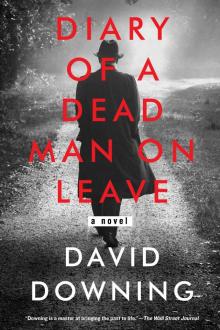 Diary of a Dead Man on Leave
Diary of a Dead Man on Leave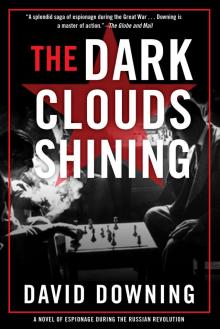 The Dark Clouds Shining
The Dark Clouds Shining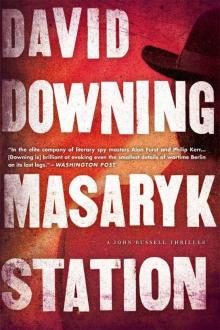 Masaryk Station (John Russell)
Masaryk Station (John Russell)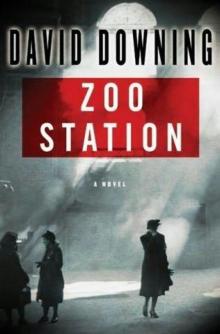 Zoo Stationee
Zoo Stationee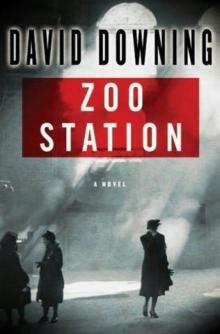 Zoo Station jr-1
Zoo Station jr-1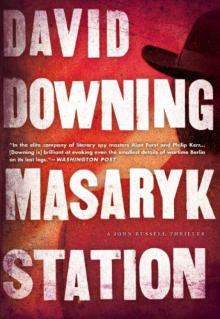 Masaryk Station
Masaryk Station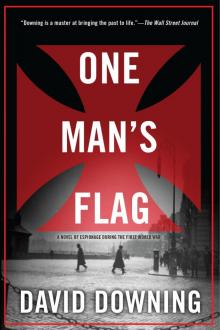 One Man's Flag
One Man's Flag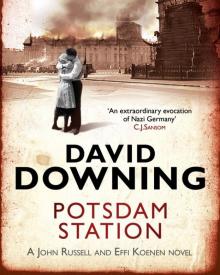 Potsdam Station jr-4
Potsdam Station jr-4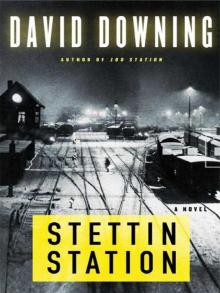 Stattin Station jr-3
Stattin Station jr-3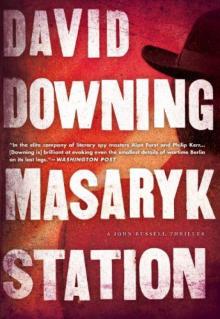 Masaryk Station jr-6
Masaryk Station jr-6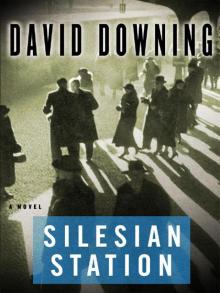 Silesian Station (2008) jr-2
Silesian Station (2008) jr-2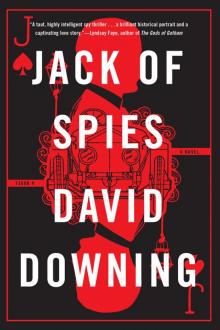 Jack of Spies
Jack of Spies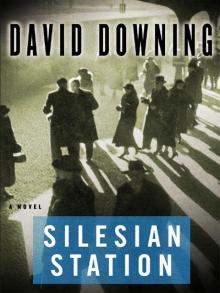 Silesian Station (2008)
Silesian Station (2008) The Moscow Option
The Moscow Option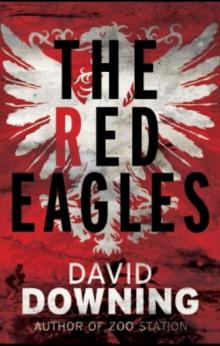 The Red Eagles
The Red Eagles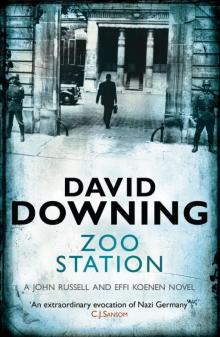 Zoo Station
Zoo Station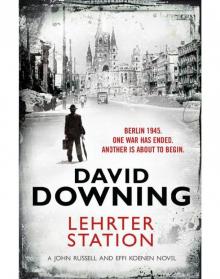 Lehrter Station
Lehrter Station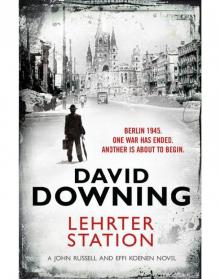 Lehrter Station jr-5
Lehrter Station jr-5